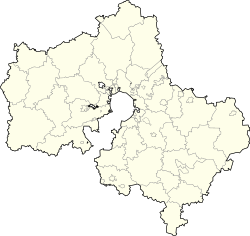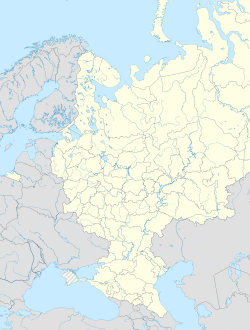Tomilino (Russian: Томи́лино) is an urban locality (a work settlement) in Lyuberetsky District of Moscow Oblast, Russia. Population: 30,605 (2010 Census);[1] 28,545 (2002 Census);[4] 27,736 (1989 Soviet census).[5] In terms of population, Tomilino is the largest urban-type settlement in Lyuberetsky District.
Tomilino
Томилино | |
|---|---|
| Coordinates: 55°39′N 37°57′E / 55.650°N 37.950°E | |
| Country | Russia |
| Federal subject | Moscow Oblast |
| Founded | 1894 |
| Government | |
| • Head of Administration | Igor Dvornikov |
| Elevation | 427 m (1,401 ft) |
| Population | |
| • Total | 30,605 |
| • Subordinated to | Lyuberetsky District |
| Time zone | UTC+3 (MSK |
| Postal code(s)[3] | 140070, 140071, 140072 |
| Dialing code(s) | +7 495 |
| OKTMO ID | 46748000071 |
| Website | www |

Tomilino consists of a multistory buildings sector and a private houses sector. Railway station in 25 kilometers (16 mi) southeast from Moscow.
In the 19th century, Tomilino was an estate of Obolensky knyazes. Tomilino was officially founded in 1894 by merchant Tomilin as a suburban settlement where he built his own house. It became very attractive for people because of a very close location to Moscow.
Later Tomilino became known as a scientific research, development, and production center. Some major enterprises were founded by the government. One of them is NPP Zvezda plant, famous for the spacesuits for Russian cosmonauts, including the one used by Yuri Gagarin, and aircraft ejector seats, which highly proved themselves in many extreme situations. There's also Mil Moscow Helicopter Plant ("Mil helicopters", "MVZ"), Tomilino plant of diamond equipment "TOMAL", Tomilino poultry farm and a textile mill. Tomilino semiconductor devices plant "TZPP" became operational at 1958. Tomilino is known as a worker's settlement since 1961.
There are several secondary schools, one sports school, one music school, one boarding school, one sanative school, and a children creative works house.
Tomilino has a local newspaper with a free-of-charge distribution "Tomilinskaya Nov" (in Russian that mean "What's new in Tomilino").
The Local Government Board of Tomilino was elected in September 2005 for five years, and is represented by Igor Nickolayevich Dvornikov and his deputies.
Twin cities
editReferences
edit- ^ a b Russian Federal State Statistics Service (2011). Всероссийская перепись населения 2010 года. Том 1 [2010 All-Russian Population Census, vol. 1]. Всероссийская перепись населения 2010 года [2010 All-Russia Population Census] (in Russian). Federal State Statistics Service.
- ^ "Об исчислении времени". Официальный интернет-портал правовой информации (in Russian). 3 June 2011. Retrieved 19 January 2019.
- ^ Почта России. Информационно-вычислительный центр ОАСУ РПО. (Russian Post). Поиск объектов почтовой связи (Postal Objects Search) (in Russian)
- ^ Federal State Statistics Service (21 May 2004). Численность населения России, субъектов Российской Федерации в составе федеральных округов, районов, городских поселений, сельских населённых пунктов – районных центров и сельских населённых пунктов с населением 3 тысячи и более человек [Population of Russia, Its Federal Districts, Federal Subjects, Districts, Urban Localities, Rural Localities—Administrative Centers, and Rural Localities with Population of Over 3,000] (XLS). Всероссийская перепись населения 2002 года [All-Russia Population Census of 2002] (in Russian).
- ^ Всесоюзная перепись населения 1989 г. Численность наличного населения союзных и автономных республик, автономных областей и округов, краёв, областей, районов, городских поселений и сёл-райцентров [All Union Population Census of 1989: Present Population of Union and Autonomous Republics, Autonomous Oblasts and Okrugs, Krais, Oblasts, Districts, Urban Settlements, and Villages Serving as District Administrative Centers]. Всесоюзная перепись населения 1989 года [All-Union Population Census of 1989] (in Russian). Институт демографии Национального исследовательского университета: Высшая школа экономики [Institute of Demography at the National Research University: Higher School of Economics]. 1989 – via Demoscope Weekly.




